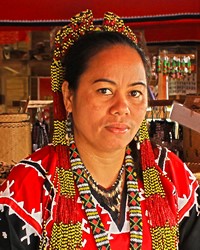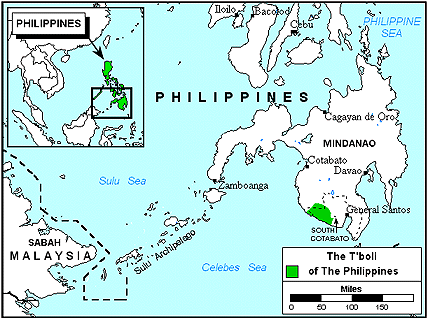The T'boli (or Tiboli) are a tribal group in the Philippines. In the past, they were often referred to as the 'Tagabili but now dislike that name. They primarily live in the South Cotabato province of Mindanao Island, which is located in the southern part of the Philippines. The Tiboli speak a Malayo-Polynesian language called Tboli. In addition to their language, many of the T'boli also speak Ilongo or Bilaan.
This great diversity has been the cause of much conflict and bloodshed among the various ethnic groups. The Tiboli have often been caught in the crossfire as various groups have battled each other.
The Tiboli are farmers who practice the swidden (slash and burn) method of agriculture. This involves cutting the forest growth, burning the debris, and planting in the clearing. Rice is their primary crop, though yams and cassava are also grown. They obtain food through hunting, gathering forest produce and fishing. The Tiboli sometimes sell bananas and other forest produce in nearby markets to supplement their incomes.
The Tiboli live in long houses that are built on six-foot stilts. Homes are generally about 50 feet long and nearly 30 feet wide. They are typically constructed of bamboo, wood and palm fronds. The people do not live in towns or villages but live apart from each other in their widely separated houses.
Distinctive and colorful clothing characterizes Tiboli men and women and is a major source of ethnic pride. They make nearly all their clothing of t'nalak, which is a cloth that has a brown background, lightened by red and beige designs. Women wear ornamental combs, earrings, bracelets and rings. The Tiboli usually cover their heads with turbans or large circular hats.
Marriages are usually arranged by the families after lengthy negotiations. Weddings are colorful celebrations that often require months of preparation. They nearly always practice monogamy (one husband, one wife). However, the rich may sometimes have multiple wives as a symbol of prestige.
Unlike most people of the Philippines, the Tiboli follow their traditional animistic religion, believing that aspects of nature have spirits. If the spirits are not appeased, they can cause the people much harm.
Although the Tiboli believe in a great pantheon of gods, the two most important are Kadaw la Sambad and Bulon la Mogow. They supposedly gave birth to the lesser gods, who either bestow benefits on people or afflict them with bad luck or ailments. The Tiboli place large wooden statues of the gods in their homes and fields. They frequently offer food and liquor to the gods for appeasement.
The Tiboli have many physical needs. Many Tiboli have little or no access to medical care. Education is inadequate, and the great majority of the adults are illiterate. Running water and modern sanitation systems are virtually non-existent, and electrical power can only be found in a few neighboring villages. Their methods of transportation and communication are extremely simple. The arrival of logging and mining operations in Tiboli territory poses a serious threat to their culture and way of life.
Despite the work of Christians among them, the Tiboli continue to serve their various gods, daily living in fear. The Bible is available in Tboli.
All around the Tiboli, conflicting religious groups continue to battle with each other. These precious people need to find the peace and love that comes through knowing Christ.
Pray for deliverance from the fear that hinders God from multiplying and blessing families and communities in this people group.
Pray for the Lord to make a way for the Kiamba Tiboli people to hear and respond to Jesus Christ.
Pray for the Lord to show himself powerful and loving to the Kiamba Tiboli people.
Pray for the Holy Spirit to give the Kiamba Tiboli people teachable and understanding hearts.
Pray for hundreds to embrace Jesus Christ no matter what the cost.
Scripture Prayers for the Tiboli, Kiamba in Philippines.
https://en.wikipedia.org/wiki/Kiamba,_Sarangani
| Profile Source: Joshua Project |











